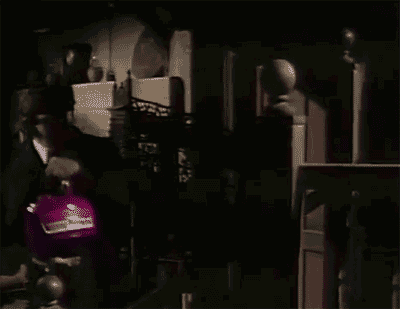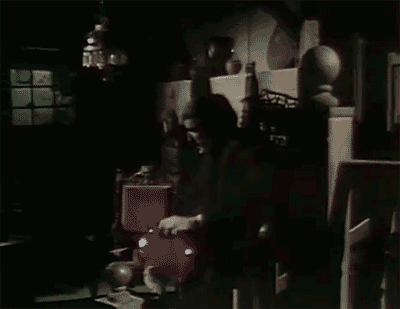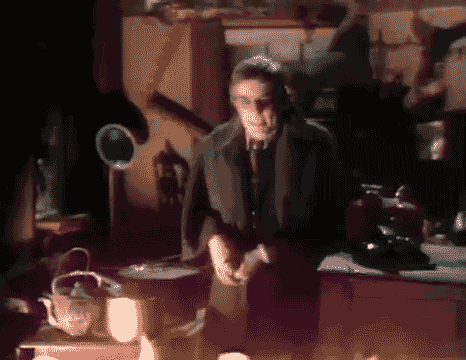
By PATRICK McCRAY
Taped on this date in 1970: Episode 955
When Angelique’s latest husband tries to burn her alive, can she reunite with an old flame? Angelique Rumson: Lara Parker. (Repeat. 30 min.)
After Sky tries to kill Angelique, she flees to the Old House, where Quentin takes her in. Sky’s attempts at reconciliation are rebuffed. Meanwhile, Barnabas pursues Maggie and even gives her the fabled engagement ring, but Quentin stops him short of biting her. Angelique, seeing Maggie as her rival, has her fall in love with Quentin just as she once had Josette fall in love with Jeremiah.
Sometimes, which is most of time, I just want to talk about why I love an episode. Dan Curtis had a famous dream about a girl on a train. I had a dream about an Angelique TV sitcom pilot. They both came true. I may like the Angelique pilot more.
With a series as sprawling as Dark Shadows, there are almost countless reasons for tuning in. If yours is Lara Parker, you’ve made an excellent choice. Beyond her obvious beauty, she fascinates due to her incredibly bright, sharp, poised presence. Her background, one part academia and one part fine, southern society, is one of our closest analogues to the world in which Angelique found her American footing. As with Jonathan Frid, wicked wit, an advanced education, and a respectable social background give her a sense of anachronistic exoticism and authority. Unlike him, however, her roots trade his wry, detached, Canadian sense of irony for the underlying, fiery passion so often associated with the American south. Put all of that together, and you have Angelique. Moreover, you have an intensely watchable performance of a frequently reprehensible character. Even when we don’t like what she does to people, we like like watching her do it. And few others could pull off such intermittent evil and have us rooting for her, anyway. When she’s bad, it’s for understandable reasons. When she’s good, she’s usually being evil anyway, and that’s towards someone even worse. Again, for understandable reasons.
For many, Dark Shadows is a TV series about Angelique. If we ever wanted to make it official, 955 is the pilot, lacking only an animated opening credits sequence in which she kisses Barnabas, whips off his tie with saucy panache, and uses it to strangle a toy soldier while winking a huge, celluloid eye at the audience. This… is pretty close. Beginning an episode with Felix being thrown onto the streets of New York by his fed-up wife is amusing. What’s better? The Angelique series (meaning 955) begins with Sky Rumson barging into her room with a torch, saying, and I kid you not, “I wanted to work it out.”
Well, if you put it like that that….
From there, we see one satisfying scene after another, fulfilling the Angelique jones we never really knew we had. Quentin even greets her with a bemused warmth set aside for reuniting celebrity frenemies on the Jerry Lewis telethon. There’s a kiss on the cheek, of-course-you-can-stay-at-the-Old-House, and warm sympathy for her husband trying to burn her alive. What’s most important is that moment of, “Quentin, I think I really did love the big lug, all along,” which is her kinda-but-not coming to the same crucial realization that Barnabas will reach in the futurepast of 1840. This reduces Quentin to mentally stammering like Hank Kimball on Green Acres because -- cue laugh track -- he just saw Barnabas macking on Maggie, and successfully, too. With Josette’s ring! He’s a vampire again, so he might as well drink the best. I mean, Joe Haskell’s out of the picture. Victoria’s out of the picture. What’s touching in this is that Barnabas is pursuing Maggie. Not Josette. But Maggie. And it’s high time. Naturally, if only Sky had tried to kill Angelique just a few hours earlier she would have beat Maggie to the punch, but then we wouldn’t have the bittersweet makings of supernatural farce.
At least we get the relief of seeing her tell Sky to get lost. I’ve had plenty of moments of watching women knuckle under to jerk boyfriends who do one horrible thing after another, but always get taken back. It’s nice to have one of them try it with Angelique. It’s like another part of the pilot, but now the pilot has gone from the 60’s world of domestic comedy to the socially conscious era of Mary Tyler Moore. Only one more hurdle… Maggie! Who’s dressing like Rhoda more and more, but still stands in the way of Barnabas.
You can hear the gears turn louder than “#1 at the Blue Whale.”
You know what? Wouldn’t she and Quentin make a nice couple? Fans keep picturing them together; they’re the Mary Ann and Professor of Collinsport. Let’s give them what they want.
 The devil’s brand makes it’s familiar return from 1795, and suddenly Quentin and Maggie are locking lips in a way that seems far more satisfying than the case of Josette and Jeremiah. Barnabas only asked this one on a date. It’s not like they’re engaged. But if you’re Angelique, and if your only tool is a love spell, then every problem looks like Kathryn Leigh Scott. At least she picked a suitor who’s bulletproof, if it comes to a duel again. All that’s left would be Angelique telling Barnabas that Maggie needs to see them kissing so that she’ll get jealous and dump Quentin. It’s for his own good.
The devil’s brand makes it’s familiar return from 1795, and suddenly Quentin and Maggie are locking lips in a way that seems far more satisfying than the case of Josette and Jeremiah. Barnabas only asked this one on a date. It’s not like they’re engaged. But if you’re Angelique, and if your only tool is a love spell, then every problem looks like Kathryn Leigh Scott. At least she picked a suitor who’s bulletproof, if it comes to a duel again. All that’s left would be Angelique telling Barnabas that Maggie needs to see them kissing so that she’ll get jealous and dump Quentin. It’s for his own good.“Angelique, it sounds crazy, but it just might work.”
You know… it just might.
Louis Edmonds turning into a cat tested well with audiences before.
This episode was broadcast Feb. 20, 1970.















































